In this blog post you can learn how to connect Spectralink IP DECT system with Microsoft Teams. I write about the requirements, which Spectralink hardware is supported for connecting with Microsoft Teams and how to configure the IP DECT server.
Microsoft supports to connect your Spectralink IP DECT system with Microsoft Teams thanks to the new Microsoft Teams SIP gateway. It allows you to connect native, certified SIP devices to your Microsoft Teams platform. Since September 2022 certified IP DECT systems are also supported.
Spectralink IP DECT system – an overview
Spectralink IP DECT solution is well known from Microsoft Lync and Skype for Business times. You can use the solution in smaller environments but also in global distributed DECT infrastructures in several sites and countries and implement it as a multi-cell DECT solution with a centralized management server. Depending on the model of your DECT server, you can address and manage up to 16.348 IP DECT stations. Even a HA configuration of your IP DECT server is possible with Spectralink to guarantee best service and availability of the service.
The handset portfolio offers a broad range of different models: starting with an entry series up to special handsets for rougher environments or where you require special safety features.
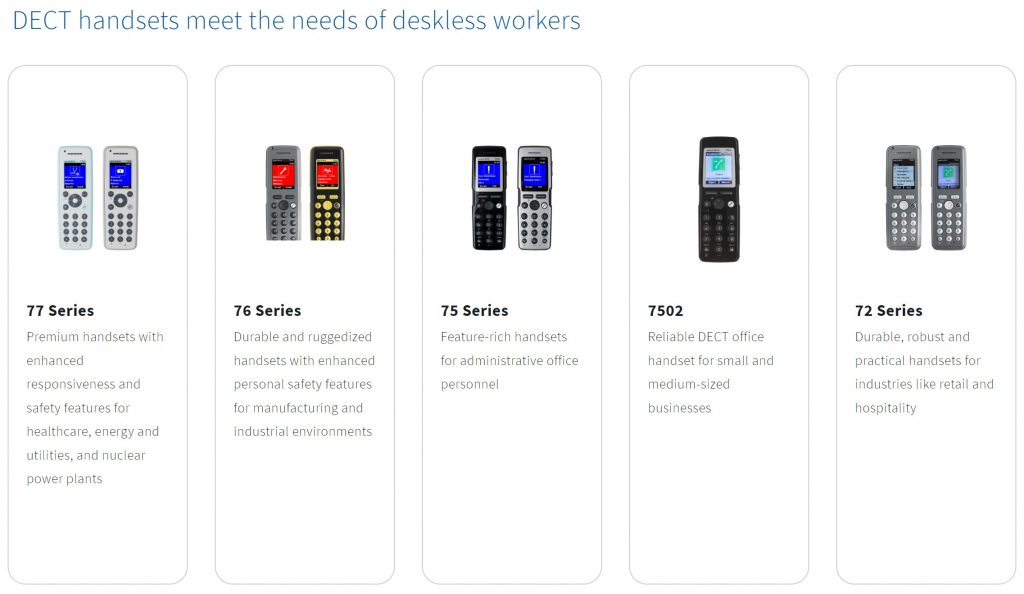
If you require an altering service for your users in case of emergency or an accident, you can connect 3rd party solution system to trigger a notification by mail, SMS and other communication services.
In sum, Spectralink is an enterprise ready DECT solution with several years of experience in this segment.
Requirements to connect Spectralink IP DECT system with Microsoft Teams
First, you need the latest firmware for your Spectralink infrastructure. The Spectralink systems (server, base stations, media resources and handsets) requires firmware version PCS22Aa. Spectralink recommends deploying the newest firmware build on your media resources and IP DECT senders first and wait for the reboot of the systems till the DECT server has deployed the newest firmware, too. The advantage to do so is, that after installing the newest firmware to your server, you can centrally reboot all updated components.
If you currently installed a firmware version older than 18, you need first install firmware version 18, then 19 and then you can upgrade to the latest one. Please refer to the Spectralink support website.
When you updated the infrastructure to the latest version, you also need a license to activate the Microsoft Teams integration.
And last, Spectralink does not support all hardware platforms. If you have an older DECT system, you need to update it to support Microsoft Teams.
The old KIRK IP-Base Stations (SKU# 02337300, 02337301) EOL (End of Life) on October 1, 2013, and EOS (End of Service) on October 31, 2016, will no longer be supported beginning with the release of PCS22Aa.
By writing this blog post, the following Spectralink IP DECT components supporting Microsoft Teams:
- IP DECT Server 200/400/6500 and Server One (virtual appliance)
- IP DECT Base Station
- DECT 72/75/76 and 77 series handsets
If you are using 3rd party DECT handsets: these are no longer supported after installing the Spectralink Teams license. And a backup of your user data from Spectralink server is no longer supported, too.
Requirements from Microsoft perspective
Microsoft Teams SIP Gateway
Microsoft has released the Teams SIP Gateway in November 2021 and let’s connect your native SIP devices to the Microsoft Teams platform. Initially, the service supported only certified IP desk phones from the well know Skype for Business Online decade and special Cisco devices. Since September 2022, Microsoft extended the service for IP DECT systems and announced to support ATA devices soon, too.
Spectralink, Ascom and Poly are the first certified vendors for the Microsoft Teams SIP gateway.
Requirements to connect the Spectralink IP DECT system with Microsoft Teams
You need the following prerequisites to use Spectralink with Microsoft Teams:
- The Microsoft SIP gateway is enabled in your tenant
- a valid Microsoft Teams Phone system user with license and phone number
- Spectralink hardware as described above
- handsets are connected to the DECT base station
Configure the Microsoft Teams SIP gateway
It is simple to active the Microsoft Teams SIP Gateway for your tenant: Open the Microsoft Teams Admin Center, go to Voice and open the Calling Policies section.
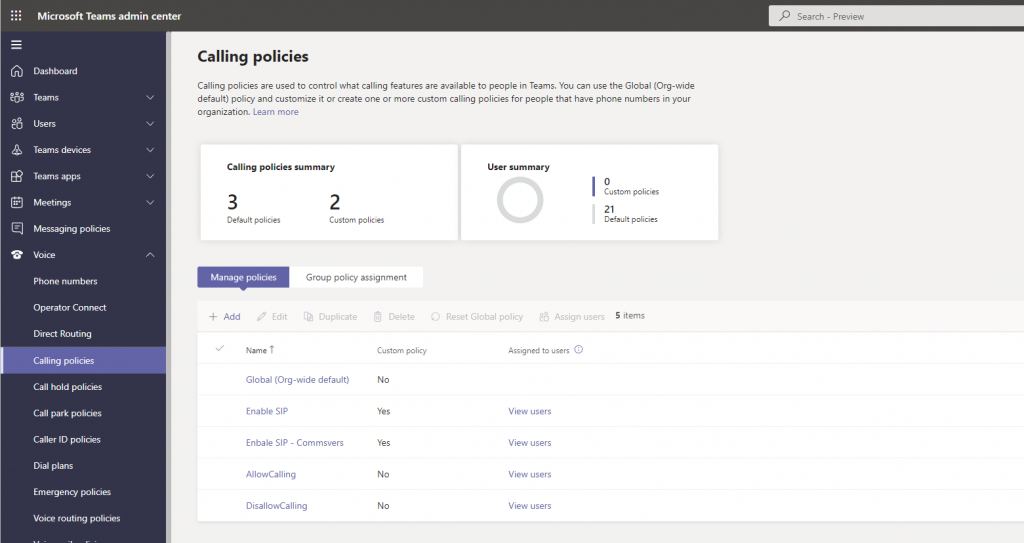
You can enable the SIP support in the Global Calling Policy or create a new Calling Policy and assign it to dedicated users only. It depends on your business needs and if you like to allow all your users to register certified devices via SIP or if you like to have more control over this feature.
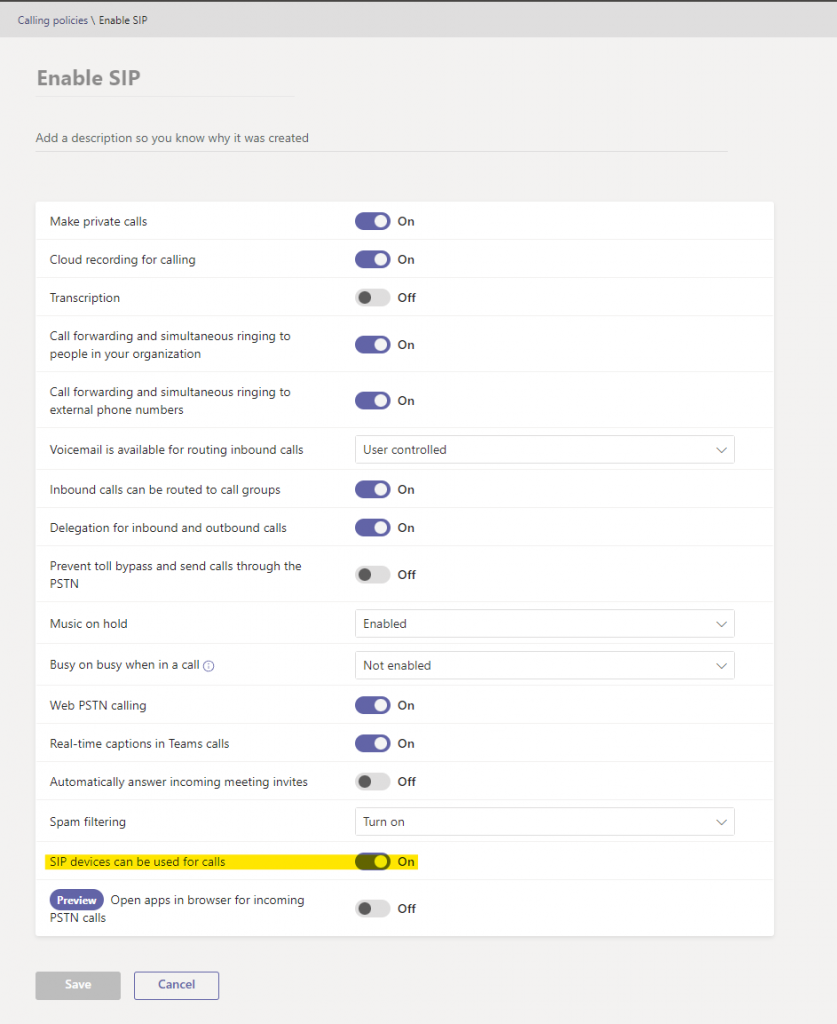
Configuring the IP DECT system connecting to Microsoft Teams
Next, you need to configure the DECT system itself and should start with some basic settings like NTP and time zone. You can find these settings under the Configuration tab -> General Configuration.
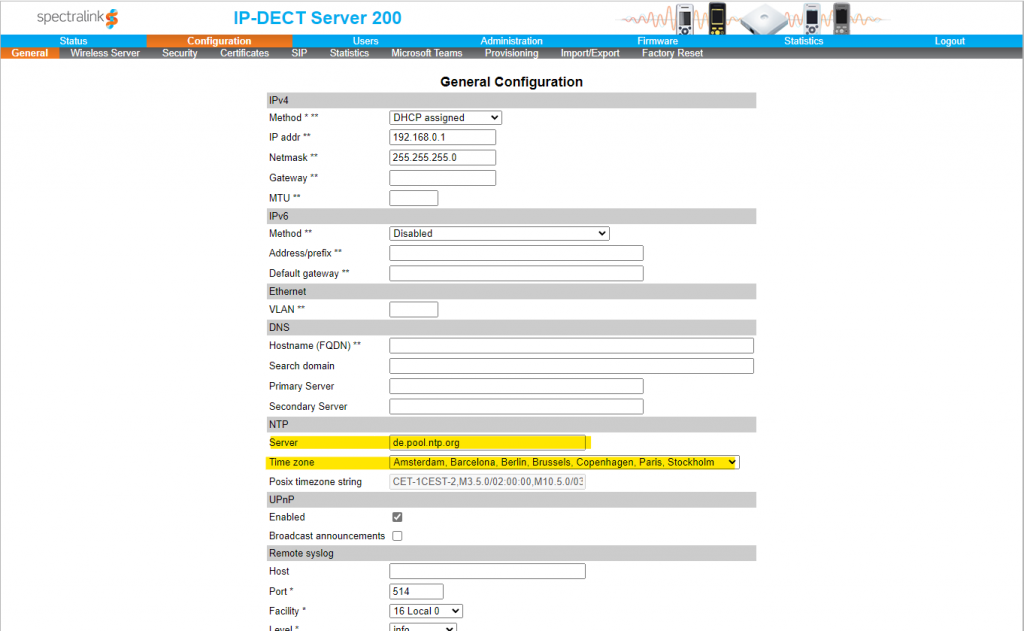
Then, you should install the required Microsoft Teams license on the Spectralink DECT server. You need to generate the license first. Spectralink provides a website for this. When you receive the valid license, open the Administration tab, and go to license. Enter the generated license key and click on load.

After installing the license key successfully, you should find a new tab named Microsoft Teams in the configuration menu.
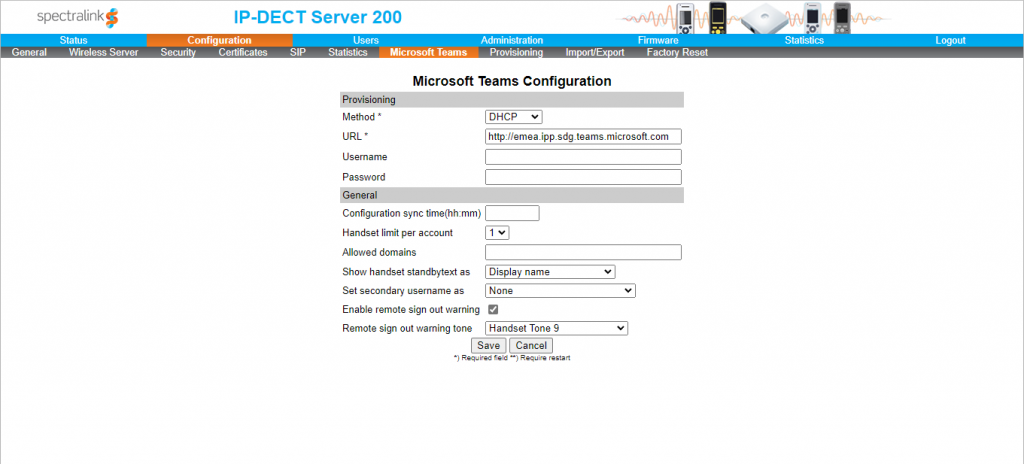
Depending on your infrastructure, you can do the provisioning by DHCP, static or disabled. You need to set DHCP Option 160 with the corresponding Microsoft Provisioning URL in your DHCP if you select DHCP.
When you select static, you need to provide the provisioning URL for the Microsoft Teams SIP gateway from Microsoft. In my case, the EMEA link was already filled out.
In the General section you can find some configuration parameters:
| Parameter | Action |
| Sync Time | Set time when the DECT server should sync new settings from Microsoft provisioning service |
| Handset Limit | Limit how many handsets a user can register |
| Allowed domains | Limit the allowed domains for user registration, comma separated |
| Handset Standby Text | Select the standby text for the handset |
| Secondary Username | select how secondary username should be set |
| Enable remote sign out warning | Sends a warning message to the handset if a user is remote signed out from Microsoft Teams |
| Tone for Remote sign out | Select warning tone |
Login in a Microsoft Teams user at a handset
It’s interesting to see how different the vendors implemented the Microsoft Teams support into their devices. You can read a blog post about the Poly Rove solution on my blog, too.
Spectralink offers two diverse ways to login to Microsoft Teams: users have an option in the menu of the handset to login in a self-service. And second way is to register the handset via the Teams Admin center. The second option can also be used for a mass-deployment of phones.
Register the handset by the user
The Spectralink handsets offers an easy-to-use way for your users to register it at the Microsoft Teams platform. They just need to open the menu from the handset and select Microsoft Teams. The handset generates a pair code for the Microsoft device registration page and gives some instructions how to continue.
Register the handset by the TAC
When using the Microsoft Teams Admin Center, the process is quite common:
- you add the phone as a new device by using the IPEI of the handset
- TAC will generate a code and you need to dial *55*<code> at the handset
- when successful, switch to the “waiting for sign in”-tab
- here you can select the handset and click on Sign in user
- submit the generated code to the end user to login with the Microsoft device page
Features for Spectralink Teams users
Beside the normal call features, a user can manage some Microsoft Teams settings with the Spectralink handset. It is possible to call the voicemail, to set a call forwarding or to sign out or re-onboard the handset.
To do this, a user can open the menu and select Microsoft Teams. To be honest, the call forwarding configuration is just a text message on how to enable or reset the call forwarding settings. But I think it’s a good help for end users and can already reduce support calls.
Also, the user can set the Microsoft Teams presence to Do not Disturb, available/online or reset the presence, too.
Conclusion
The integration of Spectralink DECT into Microsoft Teams phone system ecosystem is quite good. The installation process is simple and straight forward.
Also, the feature set for the end user is good. All relevant phone system features are configurable for the user via the handset settings. This is important when the handset is the only Microsoft Teams client, for example in case of frontline workers. In some scenarios they don’t have direct access to a computer and the handset is the only option to configure a call forwarding.
What currently is not working, is to set the phone language via the DECT server. I’ve configured German as phone language, for example. However, the phone menu was displayed in English.
Also note that by using the Microsoft provisioning service, some settings are automatically set by Microsoft. For example, the PIN for registering new handsets to the DECT server is set to the last four digits of the DECT servers ARI. I tried to change it in the WebUI without success.
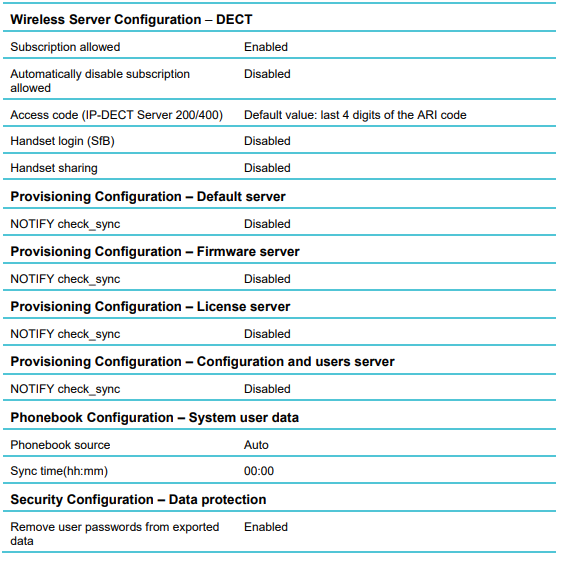
Links
Overview Spectralink IP DECT solution
Product website Spectralink IP DECT and Microsoft Teams
Spectralink implementation guide for Microsoft Teams
My session about Microsoft Teams SIP gateway at Commsverse 2022

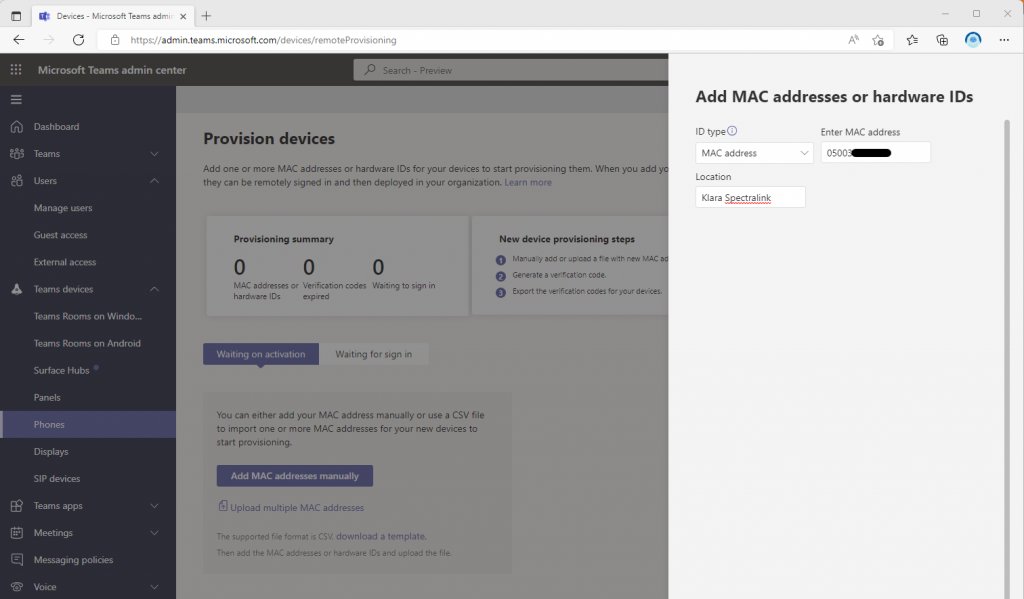
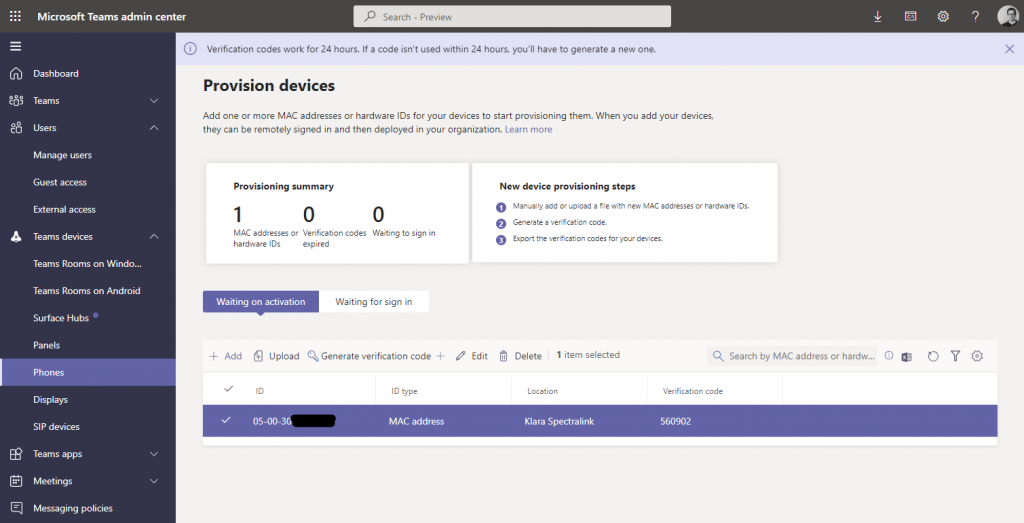
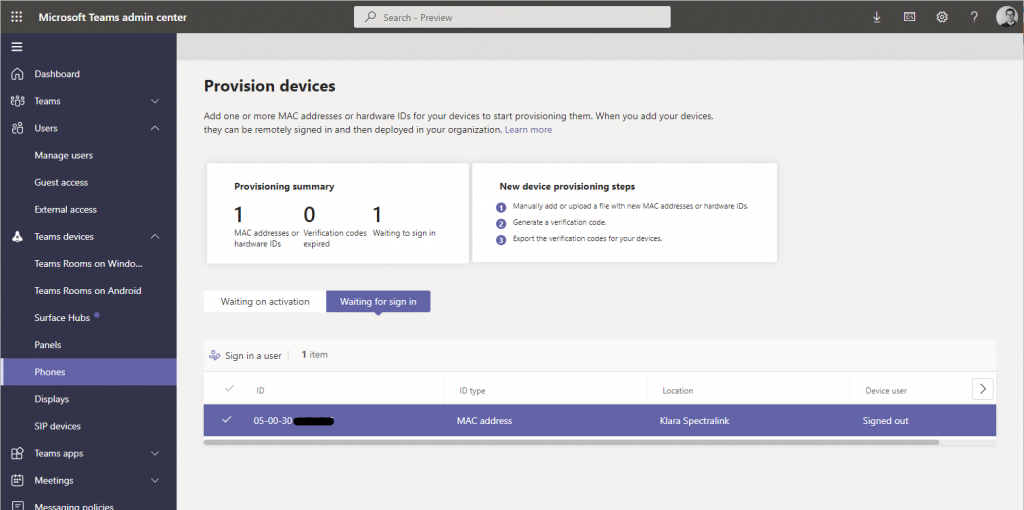
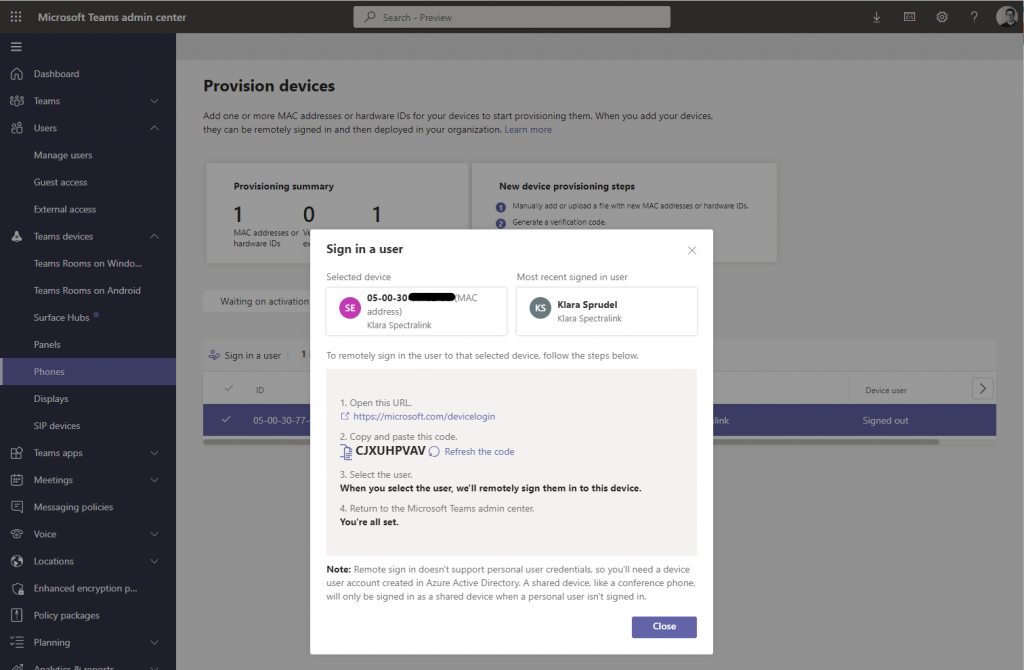
One Reply to “How to connect Spectralink IP DECT system with Microsoft Teams”